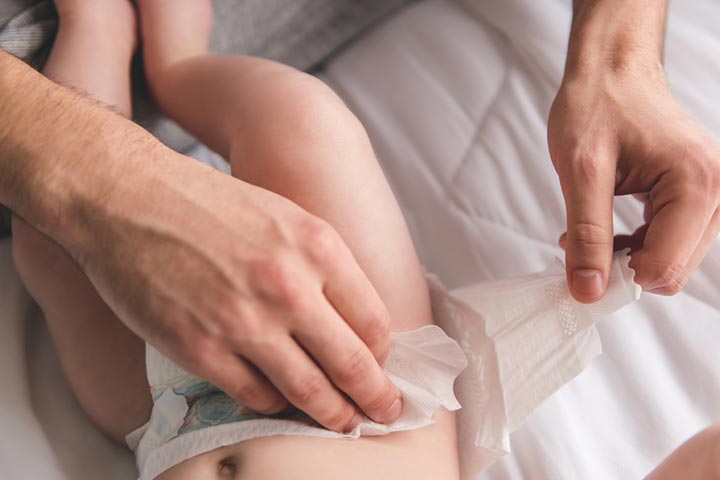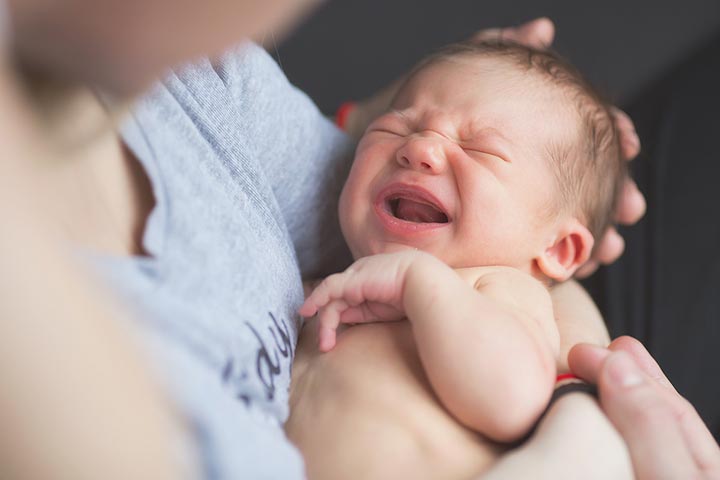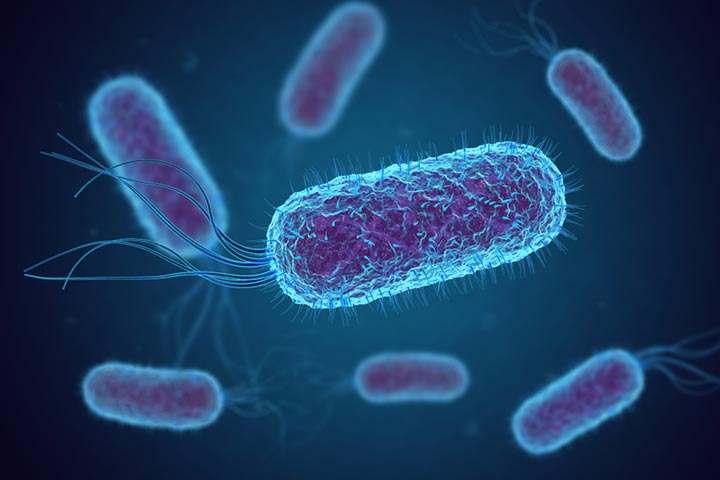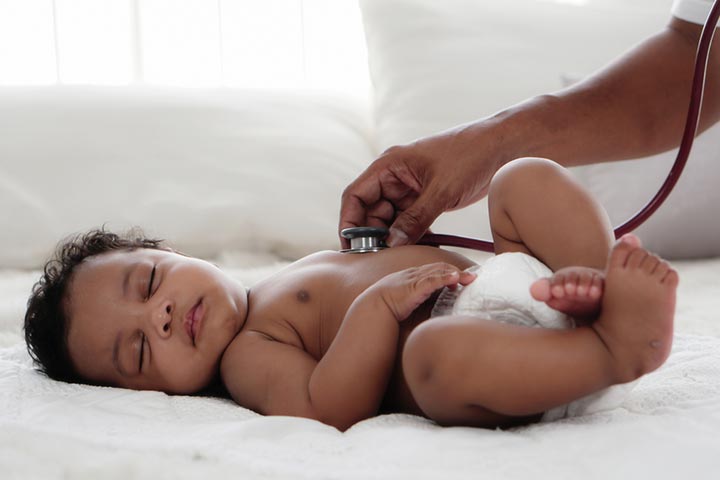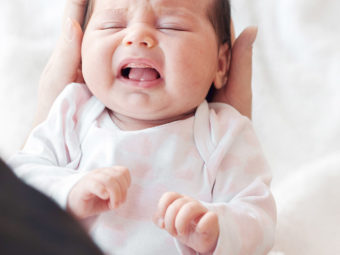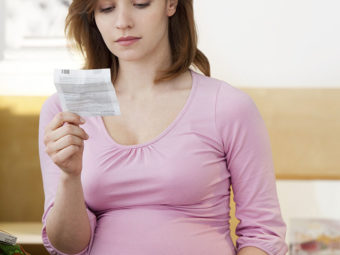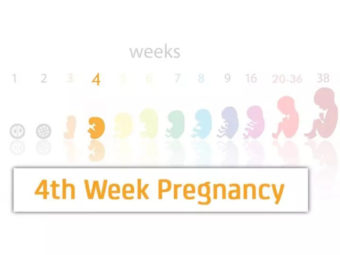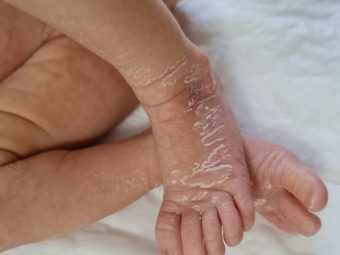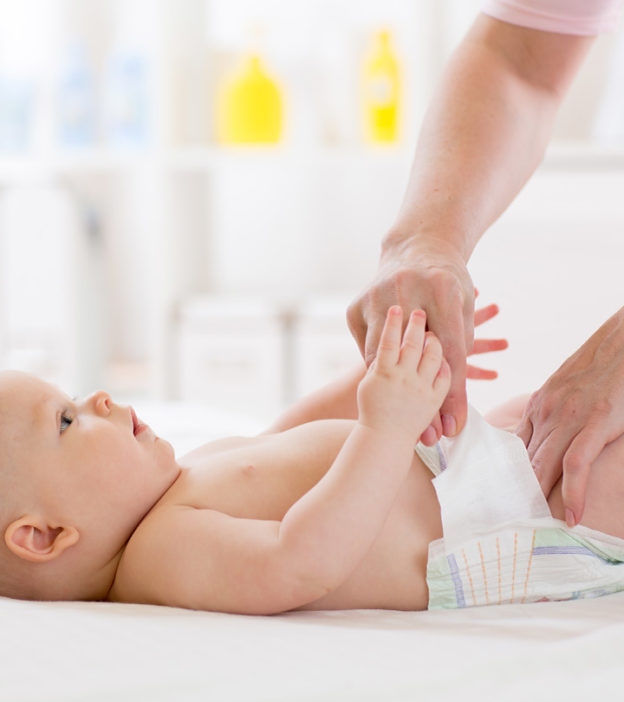
Image: Shutterstock
A baby’s stool has a typical appearance due to their formula- or milk-only diet. However, some parents may fret over the appearance of mucus in the baby’s stool. The appearance of mucus in your baby’s diaper is not always a cause of concern; however, at times, it may be seen due to some underlying cause.
Read this post to know more about the causes, diagnosis, and treatment of mucus in your baby’s poop.
What Is Mucus In Poop?
Mucus is a natural, jelly-like secretion produced by the mucous cells present across thegastrointestinal tractiXPathway from the mouth to the anus through which food passes.. Mucusprovides lubricationwithin the intestine and alsoworks as a barrierbetween bacteria and theepithelial cellsiXCells that coat the inside and outside of the body, including organs, blood vessels, and skin.that line the inside of the intestines (1) Secretions, such as saliva and snot, from other parts of the body, are also types of mucus.
吞下口水和鼻涕gastrointestinal tract where they combine with the mucus secreted in thedigestive system. Mucus travels with the waste generated by the intestine and is eventually discarded through stools (2) Therefore, having some mucus in stools is normal and a part of the body’s normal function.
According toDr. David Berger, a Greater Tampa Bay Area-based board-certified pediatrician,“Mucus in a baby’s stool does not necessarily mean something is wrong. It is naturally secreted by the intestines to help the stool move along.”
Knowing how to identify mucus in the baby’s everyday stools will help you determine whether or not it is normal, but what does mucus in baby poop look like? Read on to understand how to identify the presence of mucus in your baby’s stool.
How To Identify Mucus In Baby’s Stool?
Image: Shutterstock
Dr. Bergersays,“A baby who consumes breast milk is more likely to produce stool that contains mucus, and being naturally yellow and of loose composition, it can be difficult to determine how much of the stool is mucus.”
- Clear strings and striations in the poop. It appears asstreakson the stool.
- Gel-like coagulation. You will see lumps of stool with agel-likeconsistency.
- Shineor glisten of the stool, similar to a gel.
Yourbaby’s stoolwill not look abnormal when the amount of mucus is normal. It is when the mucus is in excess or accompanied by another symptom that it becomes a sign of a problem.
Exclusive breastfeeding in infants generally causes mucous or watery tools; however, the stool consistency can further be subdivided. The graph below shows stool consistency in babies with an exclusive breastfeeding diet. The data suggest that the infants aged 0-1 month had the highest percentage of watery stool (64%), while as they grow older, there is an increase in the rate of mucousy stool consistency (67%).
Stool consistency in exclusively breastfed infants (0-5 months)
Source:Characterizing Exclusively Breastfed Infant Stool via a Novel Infant Stool Scale; Journal of Parenteral and Enteral NutritionWhen Can Mucus In The Baby’s Stool Be A Cause Of Concern?
The following signs of mucus in the baby’s stool could indicate a problem:
- Excessive mucus.The feces is entirely slimy, and the infant consistently poops that way.The excessive mucus may also appear as white puddles in the poop.
- Mucus contains blood spots. Poop is gooey and includes tiny red spots of blood.
- Baby cries while poopingdue to the discomfort they experience when they poop.
Image: Shutterstock
- Other symptoms of ill healthsuch as stomach ache, fever, poor appetite, and general lethargy.
Take your baby to a doctor if you see these signs or if you suddenly notice mucus in stools. There are various reasons why a baby could have more mucus in the stools.
What Could Cause Excess Mucus In The Baby’s Poop?
Some conditions cause excessive production of mucus by the mucous membranes:
- Irritable bowel syndrome:A genetic ailment characterized by problems of bowel movement such as abdominal pain, diarrhea, and the presence of excessive white-colored mucus.Patients with irritable bowel syndrome (IBS) consistently produce excess mucus(4) (5). At least25%(1 out of 4) of the time, thestool will contain surplus mucus(6).
- Intussusception:A condition where a section of theintestine collapses and foldson itself to create a ring-like blockage. It is most common among babies between the ages of five tonine months(7). Intussusception can cause the baby to excrete jelly-like, mucus-ridden stools (8).
- Ulcerative colitis:It is chronic inflammation of the large intestine.Irritation of the bowel, pain, and mucusin stools are common symptoms (9). Ulcerative colitis is one of the many inflammatory bowel diseases (IBD) (10).
- Cystic fibrosis:Agenetic disorderthat leads to excess production of mucus. It leads to the accumulation of excessive mucus in the lungs and digestive system (11). Infants with the condition may excrete more mucus than usual.
- Intestinal infection:Several intestinal pathogens can lead to the passage of more mucus in stools, such as,E. coli bacteria(12), and parasites (13).
Image: Shutterstock
- Bowel polyps:These are small growths emerging from the inner lining of the gastrointestinal tract. They often lead torectal bleeding and mucusin stools (14). Polyps in infants and toddlers are called juvenile polyps (15).
- Allergies:An infant with allergies and food intolerance can excrete mucus in their stool.This happens because of the inflammation of the intestine due to ingestion of an allergic food (16). According to theCenters for Disease Control and Prevention (CDC), in 2021, among children aged between 0-17 years, 5.8% of children had food allergies.
Conditions that cause excess mucus in the stools also lead to other symptoms such as blood in the stool, abdominal cramps, poor appetite, and diarrhea. It means mucus is more likely to be obvious when your baby has mucus due to a problem.
 Quick fact
Quick factDiagnosing The Causes Of Excess Stool Mucus
The doctor performs the following tests to determine the presence of any problem:
- Physical and visual examination:The doctor will feel for any swelling or anomaly in the abdominal cavity by touching the abdomen. The rectal opening may be checked for the presence of any problem orprotrusionof a bowel polyp.
Image: Shutterstock
- Stool test:A lab analysis of the stool sample determines thequantityof mucus and also the presence of anypathogen.
- X-ray:An X-Ray provides apicture of any obstructionwithin the intestines.
- Ultrasound:A standard abdominal ultrasound provides details of the gastrointestinal tract, thepresence of polyps, and blockages.
- Colonoscopy:一个过程,医生插入一个探针to the large intestine through the rectal opening. The probe contains a camera to observe theinner lining of the intestine.
结肠镜检查可以使用其他时作为最后的手段r diagnostic methods fail or provide inconclusive results. Infants and toddlers undergoing this procedure will be under the influence of generalanesthesiaiXIt is a medication that keeps patients pain-free throughout surgeries, dental treatment, or diagnostic procedures(18).
Does Mucus In The Baby’s Stool Require Treatment?
Normal amounts of mucus in the stool do not warrant treatment. However, excess mucus accompanied by other symptoms will need management. Here is what is done to treat excess mucus in the baby’s stool:
- Medicationto treat the infections.The baby will stop pooping mucus-laden stools once the pathogen is eliminated.
- Diet changeto remove the suspected allergen can help subdue gastrointestinal allergy. The doctor will also suggest alternative food options to replace the allergen.
“Young infants are much less likely to have food allergies if breastfed than bottle fed. If a formula-fed baby experiences allergies, I will determine if the formula contains cow milk protein, and if it does, I typically recommend goat milk-based products that may be tolerated when the cow-based formula is not,”shares Dr. Berger.
- Surgerymay be necessary in the case of severe Intussusception and inflammatory bowel disease.
- Long-term managementis necessary in the case of genetic diseases that often do not have a definitive cure. Effective management as suggested by the doctor is the only way to alleviate the symptoms like excess mucus in the stools.
Frequently Asked Questions
1. Can teething cause mucus in a baby’s poop?
It is believed that the saliva produced during teething may be seen in the baby’s poop (17). However, no studies indicate a definite correlation between teething and mucus in a baby’s poop.
2. Can a cold cause mucus in baby poop?
Cold causes excess mucus production in the lungs and the nose. The baby may swallow this mucus, and it may be expelled through poop. However, not all babies who develop a cold may show mucus in their poop.
3. Can drooling cause mucus in baby poop?
Drooling may cause mucus in baby poop (18). The excess saliva may irritate the intestine, increasing the chances of mucus in the stool. However, it may not happen with all babies who drool excessively.
The appearance of mucus in a baby’s stool is expected due to their formula or exclusive breastmilk diet. However, excessive mucus and other signs, such as crying when pooping, fever, stomachache, or blood in the stool, may indicate an underlying condition. So, if you notice abnormalities, make an appointment with your child’s doctor for the correct diagnosis and treatment. Once the underlying issue is treated, the amount of mucus in the baby’s stool will return to normal. Medication and dietary changes are the most common treatments; however, surgery and long-term treatment may be required in the case of a severe medical problem.
Infographic: Mucus In Baby’s Stool
Parents often fret over the appearance of mucus in their baby’s stool. However, it is normal and not always a cause for concern. Check out this infographic to learn about:
- Appearance of mucus in baby’s stool
- Possible causes of mucus in baby’s stool
- When to worry
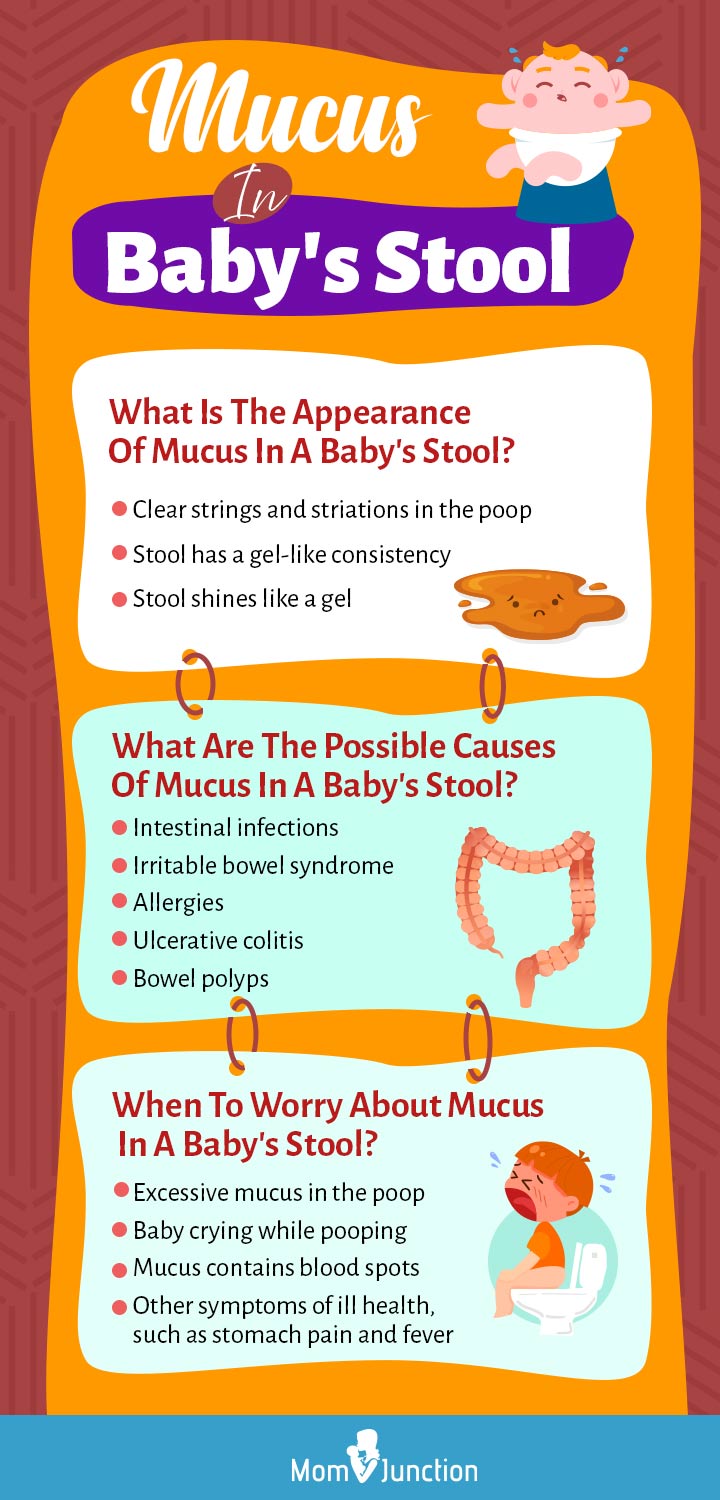
Illustration: Momjunction Design Team
Get high-quality PDF version by clicking below.
Download Infographic
Key Pointers
- Some mucus in the baby’s stool is normal and a part of the body’s normal function.
- Excessive mucus or mucus with other symptoms like blood in stool indicates an underlying problem.
- Identifying the precise cause and timely initiation of treatment can help mitigate the risk of complication.
This video serves as a helpful guide to understanding mucus in baby poop. Learn what it looks like and when to be concerned.
References:
- 胃肠障碍;科罗拉多州立University
http://www.vivo.colostate.edu/hbooks/pathphys/digestion/stomach/gibarrier.html - Mucus Does More Than You Think; Massachusetts Institute of Technology
https://scopeweb.mit.edu/mucus-does-more-than-you-think-8b12f8f6feae?gi=1cfc6ed1c547 - 5 Signs You Have Irritable Bowel Syndrome; Franciscan Health
https://www.franciscanhealth.org/news-and-events/news/5-signs-you-have-irritable-bowel-syndrome - Symptoms & Causes of Irritable Bowel Syndrome; U.S. Department of Health and Human Services
https://www.niddk.nih.gov/health-information/digestive-diseases/irritable-bowel-syndrome/symptoms-causes - H. Vahedi et al. Irritable Bowel Syndrome: A Review Article; National Center for Biotechnology Information
https://www.ncbi.nlm.nih.gov/pmc/articles/PMC4154827/ - Intussusception; The University of Chicago
https://pedclerk.bsd.uchicago.edu/page/intussusception - Intussusception; Children’s Hospital of Philadelphia
https://www.chop.edu/conditions-diseases/intussusception - Ulcerative colitis; NHS UK
https://www.nhs.uk/conditions/ulcerative-colitis/ - Irritable Bowel Syndrome (IBS) and Inflammatory Bowel Disease (IBD); American Academy of Pediatrics
https://www.healthychildren.org/English/health-issues/conditions/abdominal/Pages/Irritable-Bowel-Syndrome-IBS-and-Inflammatory-Bowel-Disease-IBD.aspx - Diagnosed With Cystic Fibrosis; Cystic Fibrosis Foundation
https://www.cff.org/What-is-CF/Diagnosed-With-Cystic-Fibrosis/ - Infectious Diseases Related to Travel; Centers for Disease Control and Prevention
https://wwwnc.cdc.gov/travel/yellowbook/2018/infectious-diseases-related-to-travel/escherichia-coli-diarrheagenic - E. M. Hechenbleikner & J.A. McQuade Parasitic Colitis; National Center for Biotechnology Information
https://www.ncbi.nlm.nih.gov/pmc/articles/PMC4442724/ - Bowel polyps; NHS UK
https://www.nhs.uk/conditions/bowel-polyps/ - C.A. Durno Colonic polyps in children and adolescents; National Center for Biotechnology Information
https://www.ncbi.nlm.nih.gov/pmc/articles/PMC2657698/ - Allergic Colitis; Boston Children’s Hospital;
https://www.childrenshospital.org/conditions-and-treatments/conditions/a/allergic-colitis - Colonoscopy with General Anesthesia Infants and Toddlers; Nationwide Children’s Hospital
https://www.nationwidechildrens.org/family-resources-education/health-wellness-and-safety-resources/helping-hands/colonoscopy-with-general-anesthesia-infants-and-toddlers - Your Infant is Teething: Know the Signs and Symptoms
https://www.chla.org/blog/rn-remedies/your-infant-teething-know-the-signs-and-symptoms - Is Green Baby Poop Normal?
https://americanpregnancy.org/healthy-pregnancy/first-year-of-life/green-baby-poop/



